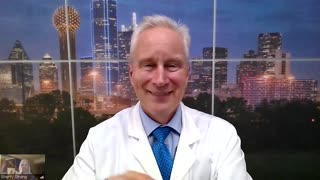Dr. Chris Shaw - PhD, Neurologist & Author - CHDC
This interview with Dr. Shaw is a must watch if you really want to get an idea of what is going on in the science and research world in relation to funding and how unbiased research gets out. He is an informative, funny and hopeful guest to interview.
He is the author of over 150 peer reviewed papers and four books. The latest book is 'Dispatches from the Vaccine Wars' is released August 2021 and I'll be doing a follow up interview for CHDC to cover this as well.
Dr. Shaw's Bio
My laboratory's key focus over the last few years has been on the unusual neurological disease of Guam and the Western Pacific, ALS-parkinsonism dementia complex (ALS-PDC). I view this disease as a kind of neurological Rosetta Stone able to unlock some of the key questions in neurological disease research. For example: what are the causes of ALS, Parkinson's, and Alzheimer's and what are the pre-clinical stages of each? Our approach has been to create an in vivo animal model in which we can look at behavioural changes in motor and cognitive functions, as well as systems, cellular and biochemical modifications as the disease process emerges over time. We have identified a novel class of neurotoxins in the course of our initial studies and are now beginning to understand the toxic mechanisms of action that lead to the death of neurons in the spinal cord and brain. The overall goal of this work is to identify key etiological factors involved in sporadic neurological disease and the early stages of the disease process. From the first could come effective prophylaxis; from the latter, early phase treatment before irreversible damage to the CNS has been done.
A second theme to our work is to seek potential therapeutic agents for existing neurological disease states using the above, and other, animal models. In particular, we are focusing our attention on progranulin, a neuroepithelial growth factor, and on a class of molecules called ginsenosides. Preliminary data with progranulin suggests that the molecule can exert powerful neuroprotective effects and perhaps even reverse early phase neurodegeneration.
The last aspect of our work, and one that is still emerging, is to look at the potential for compounds such as aluminum to be neurotoxic. We are interested in the types of aluminum compounds that can cause neurodegeneration, their route of administration, the impact of dose and duration, and the crucial but largely unexplored aspects of age and sex. These studies are just beginning, but show great promise to help us understand the origin of neurological disorders as diverse as autism spectrum disorder and Alzheimer's disease.
-
 55:40
55:40
Children's Health Defense Canada
6 months agoDr. Peter McCullough's #1 Advice STOP Getting the Shots
8205 -
 23:19
23:19
Scammer Payback
4 days agoWe Created the First Ever 𝗔𝗡𝗧𝗜-𝗦𝗖𝗔𝗠 Call Center
178K220 -
 1:11:09
1:11:09
LFA TV
14 hours agoTRUMP GUILTY…OF LOVING AMERICA! Ft. Hayley Caronia & Vish Burra | LAST CALL 6.1.24 8PM EST
32.6K17 -
 1:02:02
1:02:02
The Kirk Minihane Show
6 hours ago420 Show
18.2K -
 1:06:35
1:06:35
Patriots With Grit
5 hours agoSpeaking Up, Pushing Back | Daniel McGirr
15.2K5 -
 56:19
56:19
Total Horse Channel
2 days ago2024 Buckeye Reining Series | Saturday Night | 7:30 pm EST
19.1K2 -
 1:15:38
1:15:38
Steve-O's Wild Ride! Podcast
2 days ago $0.22 earnedG Eazy Opens Up About Falling Off - Wild Ride #217
23.8K11 -
 18:44
18:44
We Profit with Stock Curry
6 days agoUltimate Advice for Teens & Young Adults
29.2K13 -
 LIVE
LIVE
Lofi Girl
1 year agoSynthwave Radio 🌌 - beats to chill/game to
205 watching -
 21:00
21:00
Mr. Build It
23 days ago3 Ways to Build Garden Beds
29.7K14